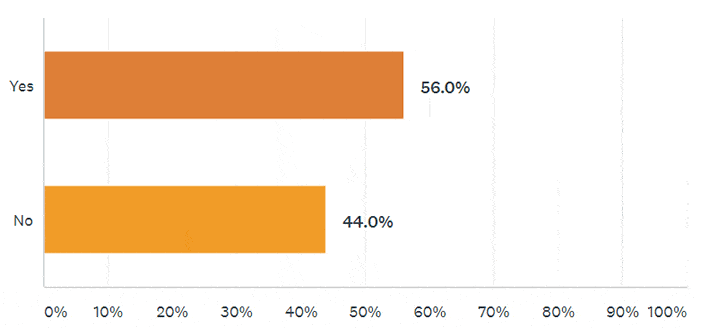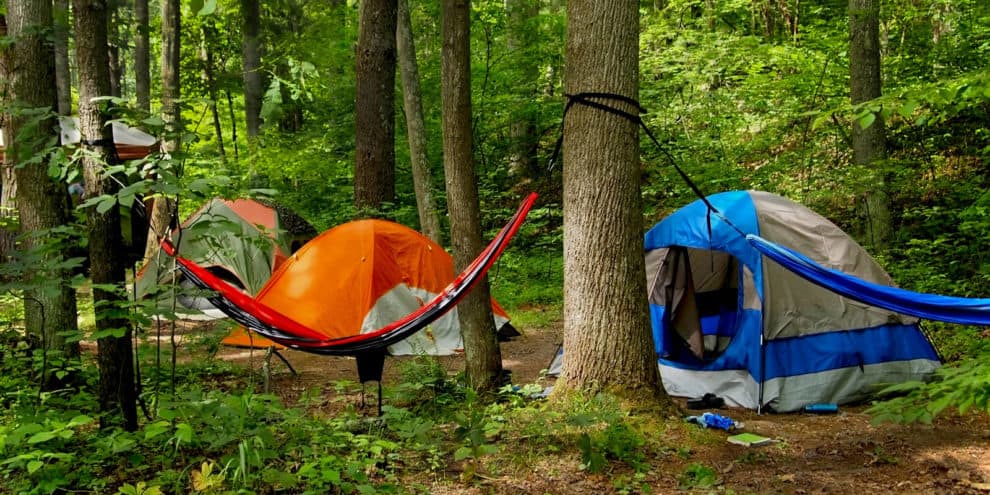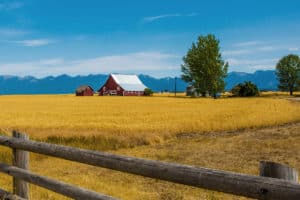According to the June LANDTHINK Pulse results, 56% of respondents would be willing to rent or lease their rural land for short term recreational uses, such as camping and RVing. A recreational lease is an agreement between a landowner and a tenant that allows the tenant to participate in a recreational activity on that property for a specified period of time for a fee. As demand for outdoor recreation has increased, leasing land is gaining popularity and landowners are taking action to help with the carrying costs associated with owning land. The income generated from a recreation lease can offset rising property taxes and land management costs, and help strapped landowners avoid having to sell or develop their land. Absentee landowners can have the peace of mind knowing there is a presence on their land, to guard against trespassing, theft, vandalism and illegal dumping.
Last month, the June Pulse asked: Would you be willing to rent or lease your land for short term uses such as camping/RVing?
Camping is making a big comeback, thanks to Millennials and Gen Xers. Whether it’s a backcountry adventure or “glamping” (camping with amenities), more and more people are venturing outdoors to pitch their tent and spend some time under the stars. According to the 2018 North American Camping Report, sponsored by Kampgrounds of America (KOA), “77 million U.S. households have someone who camps at least occasionally.” The report indicates that Millennials and Gen Xers make up three-quarters of all campers. Millennials in particular are going crazy for camping; the group alone accounts for 40% of campers. Millennials are seeking out authentic experiences that let them relax and escape the hustle of city life, and avoid the expense of staying at a hotel, flying or driving, and eating out. The report discovered that 46% of campers stay within 50 miles of home.
In the last few years, a number of companies modeled after Airbnb like Hipcamp and Gamping (stands for “garden camping”) have launched, helping outdoor enthusiasts rent a campsite from private property owners. It’s a win-win for everyone. Instead of a noisy and crowded KOA, campers get a beautiful, secluded campsite and landowners make some extra cash.
If you already own vacant land out in the country or you’re thinking of investing in land, leasing it out to campers might be a way to generate some income from your tract. If you’re willing to put in some work, it can pay significant dividends. To make the property more attractive to campers, landowners should provide bathroom access (such as Porta Potties or an outbuilding), access to clean drinking water, electricity, and trash disposal. Leasing your land does require some legwork, but it’s necessary to generate the highest income potential. Landowners should always work with an attorney to negotiate terms before entering into any type of lease agreement.
Landowners interested in entering into a recreational lease should start by visiting their local city or county zoning and planning office to see if there are regulations regarding camping on residential properties. In some areas, camping might be prohibited. Learn about septic and sewer regulations. It’s also a good idea to check rules on campfires. If your property is subject to the CC&Rs (covenants, conditions, and restrictions) of a homeowners’ association, verify that camping is permitted. Also, consider how your land is titled. Do you need the permission of co-owners or future interest owners to agree to the lease? Last but not least, consult with an attorney to make sure you have the proper insurance coverage to cover camper injury or property damage.
One booking service for private camp sites, Hipcamp, claims to provide a “very robust insurance policy that protects landowners up to $1M”. Land buyers that are evaluating the income potential of recreation activities on a piece of property, would be wise to use a good land agent who will provide and help analyze information about potential revenue sources.
The results of our informal online survey reflected that the majority (56%) of our audience was in favor of leasing their land to campers; 44% responded “NO”, preferring not to open their land up to the public for recreational uses like camping and RVing. It comes as no surprise that many would not consider leasing their land. After all, leasing property, even for short term uses, comes with distractions and risks. Landowners need to monitor the land vigilantly, to ensure the lessee is making on-time payments and not causing any type of damage to the land. Lessors should reserve the right to access the property at any time and for any purpose. Also, by choosing to lease their property, landowners often sacrifice use of the land for themselves, relatives and friends. Leasing land for camping and RVing requires careful consideration and a through examination of your land management objectives to determine if it fits your needs and situation.
Here are the final results:

We were pleased that so many people chimed in on this question, and we thank everyone who answered the Pulse and shared it on social media with friends and connections in the land industry. LANDTHINK would like to extend a big thank thank you to Blueshore Direct for sponsoring the June Pulse and for coming up with a very interesting question to pose to our audience. Blueshore Direct and its knowledgeable staff work hard to meet customers and individual needs by providing the finest tracts of land at below market pricing. While they primarily provide residential opportunity and land consultation, they also work as a community resource for acquisitions. Blueshore Direct is committed to careful environmental stewardship, high-integrity dealings, and most of all – making the process of purchasing land as smooth and seamless as possible.
Become a Pulse sponsor! It’s a great way to ensure your brokerage is the first one buyers and sellers call when they have a need to buy or sell property. You’ll get insane exposure on Social + Email + Web. That’s 500,000+ monthly eyes on you! Once you have it, you won’t want to give it up! Pulse sponsorships are offered on a first come first serve basis and are subject to certain limitations. If your business would be interested in sponsoring the August Pulse question, please contact us soon.
Do you have a suggestion for next month’s Pulse question? Submit your question and we might choose yours!
We want to know what you think about our July Pulse question, chosen and sponsored by FARMFLIP: Do you support work requirements for SNAP recipients being included in the 2018 Farm Bill? Answer now.
This content may not be used or reproduced in any manner whatsoever, in part or in whole, without written permission of LANDTHINK. Use of this content without permission is a violation of federal copyright law. The articles, posts, comments, opinions and information provided by LANDTHINK are for informational and research purposes only and DOES NOT substitute or coincide with the advice of an attorney, accountant, real estate broker or any other licensed real estate professional. LANDTHINK strongly advises visitors and readers to seek their own professional guidance and advice related to buying, investing in or selling real estate.










When all other requirements are met, should the county dictate how large a cabin should be if you decide to build on your land?